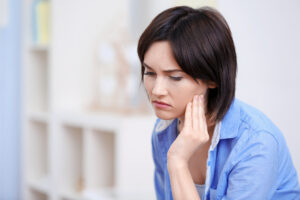Do you seem to have constant headaches or struggle with neck, shoulder, face, or jaw pain? It could be a problem associated with your Temporomandibular joint (TMJ). TMJ disorder, or TMD, occurs when there are issues within the temporomandibular joint. This joint connects the lower jawbone to the rest of the skull. Some of the causes of TMD include: Physical injury to the jaw, grinding or clenching of the teeth, Arthritis/inflammatory disorders, or dislocation of ball and socket. Unfortunately, thousands of people suffer from TMJ disorders and don’t even realize it.
SYMPTOMS OF TMJ DISORDER
TMJ pain is often a symptom of TMJ disorder (TMD, TMJD), although not everyone with joint pain has an actual joint disorder. When the TMJ does not function properly, those affected may experience many frustrating and painful symptoms including:
- Jaw pain
- Facial muscle pain
- Neck and shoulder pain
- Limited range of motion
- Ringing or buzzing in ears
- Difficulty chewing or biting down
- Popping and clicking within the joint
- Joint dislocation
- Deterioration of the joint tissues
By correcting symptoms early enough our Magna dentist office can help you live your life without the pain associated with TMD.
HOW TO RELIEVE TMJ PAIN
One of the most common reasons for TMJ pain is chronic teeth grinding and clenching, also known as bruxism. The excess tension to your TMJ can cause pain to radiate throughout the joint and surrounding tissues. Some people can even experience ear aches and migraines. Bruxism is most often a subconscious habit, where teeth grinding or clenching happens during sleep or when stressed. If you are someone who tends to grind or clench your teeth during the day or night, we recommend wearing a discreet bite splint during the day and using a night guard while asleep.
So how does a night guard help with TMJ symptoms? When you sleep in a bruxism mouthguard, it provides a gentle buffer between your upper and lower jaw. This prevents the muscles around your jaw from completely contracting, so the muscles can relax. Wearing a night guard can help relieve joint tension, prevent unnecessary tooth wear, and prevent cracked dental restorations. When your jaw is able to relax, you’ll be able to wake up without painful headaches, sore teeth or joint stiffness.
HOME REMEDIES FOR TMJ PAIN
In addition to wearing a mouthguard, there are simple steps you can take at home to help with any pain or discomfort. These include:
- Take an anti-inflammatory, such Ibuprofen or Motrin
- Apply a warm, moist compress to the painful area for up to 20 minutes
- Massage
- Jaw exercises
- Avoid firm foods
- Relax or meditate
TMJ TREATMENT
Cyprus Family Dentistry can help you find a way to treat your TMJ pain at night (or during the day) by calling our Magna dental office. A full-mouth X-ray will be taken to assess the joints on both sides of your face and Dr. Cantwell will fully evaluate your jaw. Depending on your range of motion and how your teeth look, we might recommend a bruxism mouthguard.
To fit you with a TMJ appliance, we’ll take an impression of your teeth, then use that mold to pour a replica model of your mouth, which is then used to make an acrylic or other durable BPA-free mouthguard. About a week or two later, we’ll have you try on your appliance and make any needed adjustments. You don’t have to deal with the pain from a TMJ disorder, contact our office today at (801) 250-0203 to get started on your TMJ treatment. We can’t wait to eliminate the symptoms of your TMJ disorder!
